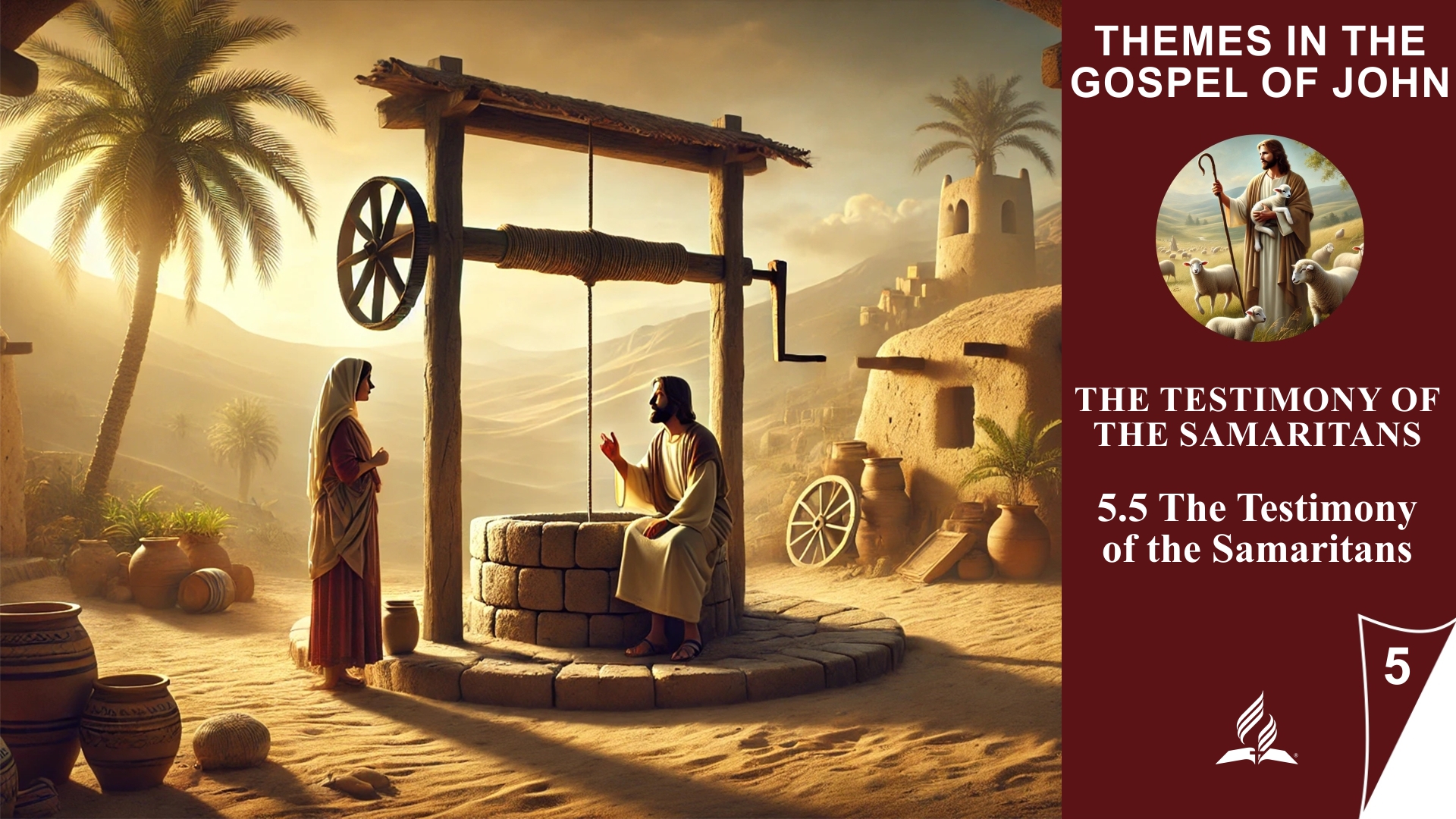


5.5 The Testimony of the Samaritans
The Power of a Personal Testimony: One Woman Changes a City
Read John 4:27–29. What did the woman do unexpectedly?
In John 4:27–29, something remarkable happens: the woman, who was previously rather reserved and burdened with a difficult past, becomes the first witness for Jesus in her city. Although the conversation ends abruptly, she leaves her water jar behind and runs back to the city to share her encounter with Jesus. This symbolic act—leaving the jar—shows that she found something much greater than the water she originally sought. She now has a new, living source within herself.
Her reaction demonstrates the natural impulse to proclaim the Gospel when one has experienced deep spiritual fulfillment and renewal. From an encounter filled with personal revelations and transformation, she becomes a bold ambassador inviting others to encounter Jesus. She speaks without fear and leaves behind the societal expectations that might have previously held her back. Her testimony is simple but powerful: “Come, see a man who told me everything I ever did!”
The woman’s testimony reminds us that true encounters with God not only change us but also invite others to share in that experience. Her transformation from reservation to bold testimony shows that God can enable each of us, regardless of our past or social standing, to share His love and truth. This story challenges us to openly share our faith experiences and invite others to discover Christ for themselves.
Read John 4:30–42. What happened after this encounter, and what does it teach about how the Gospel can be spread?
After her encounter with Jesus, the Samaritan woman becomes the first evangelist in her city, and the Gospel spreads among the Samaritans. The people in the town come to personally experience Jesus, and through the time He spends with them, many more come to believe. The woman’s initial transformation, which led her to spontaneously testify about Jesus, develops into a wave of faith throughout the entire community.
Interestingly, Jesus interrupts this narrative by reminding His disciples of the image of the harvest. He shows them that proclaiming the Gospel is an urgent task that requires patience and willingness to go beyond cultural and societal prejudices. For Jesus, this spiritual harvest is more important than the need to eat. His goal is to bring the message of salvation to all people, including those whom the disciples might consider “foreign” or “unworthy.”
The account highlights two important lessons about spreading the Gospel:
-
Personal Testimony as a Key to Evangelism: The woman simply and honestly shared what Jesus had done for her. Her testimony touched the hearts of others, making them curious about Jesus. Even today, sharing our own encounters with God can inspire others and give them the desire to know Him as well.
-
Direct Encounter with Jesus: Although the woman’s testimony sparked the Samaritans’ faith, their belief grew through personal encounters with Jesus. They asked Him to stay with them, and He lived among them for a time, allowing them to hear His words directly. This encounter deepened their faith and made it independent of the woman’s testimony. The text shows us that mature faith grows through personal encounter and our own experience with Christ.
The Gospel spreads most effectively through authentic testimony and the willingness to provide people with direct encounters with Jesus—whether through community, teaching, or the example of our lives. The story of the Samaritans reminds us that the Gospel knows no boundaries and that everyone can experience salvation through personal experience and testimony.
What should this account teach us about how powerful a single person’s testimony can be? How powerful is your testimony of what Jesus has done in your life?
This account powerfully demonstrates that a single person’s testimony can have an enormous impact. The Samaritan woman, transformed by a personal encounter with Jesus, shares her experience and thereby touches the lives of many in her city. Her simple yet authentic recounting of Jesus awakens interest and faith in others to know Him themselves. The testimony of this one woman leads many Samaritans to recognize Jesus as the Savior of the world.
This story reminds us that our personal testimony can be powerful because it is genuine and inspires others to consider the possibilities of grace and change. When we share how Jesus has helped us, healed us, or guided us through difficult times, it can touch others more than any theological argument ever could. An authentic testimony builds trust and allows others to see that God’s work is real and accessible.
The question for us is: How powerful is our testimony? It becomes powerful when it is honest and courageous, when we authentically share how God has met us in our lives. Even if we feel small or believe our story is not particularly important—the experience of the Samaritan woman shows that God uses the simplest testimonies to reach hearts and change lives.
The story of the Samaritan woman shows us how powerful a person’s personal testimony can be and how it can authentically spread the Gospel. Her encounter with Jesus led not only to her own transformation but also to a movement of faith throughout her entire community. This experience also holds deep significance for our faith life and daily living today.
-
Courage to Be Open: The Samaritan woman experienced a radical transformation—from reserve and isolation to bold testimony. This shows that we too can openly share our experiences and God’s work in our lives. We often tend to keep our personal struggles or experiences with God to ourselves. However, it is in this openness that the potential lies to inspire others and encourage them to seek God themselves.
-
The Impact of an Authentic Testimony: The story teaches us that the Gospel is most effective when it is authentic and heartfelt. The woman simply shared what she had experienced with Jesus—and this moved the people. In our daily lives, we can encourage others and build trust by sharing our personal experiences with God. A testimony does not need to be perfect or complex to be powerful; honesty and authenticity are the keys.
-
God Can Use Each of Us: This story reminds us that God can use us, regardless of our background or past, to reach others. The woman at the well became the first evangelist in her city despite her past and social status. Likewise, we are capable of being guides to Jesus for others if we allow Him to use us and do not let others’ opinions hold us back.
-
Spreading the Gospel Across Boundaries: The Gospel is a message that transcends cultural and social boundaries. Jesus proclaimed the Gospel to a people whom Jews often rejected at that time. The encounter shows that God’s love knows no barriers and that we are permitted to reach people with the Gospel message regardless of their background, status, or culture.
This story calls us to courageously and honestly give testimony in our daily lives while recognizing the transformative power of our own faith. It reminds us that each of us has a unique story that can touch the lives of others and bring them closer to God. The question for us is: Are we ready to share our testimony boldly and authentically, thereby showing others the way to Jesus?
Your personal testimony can be the light that illuminates someone else’s path.
(Visited 14 times, 1 visits today)






















